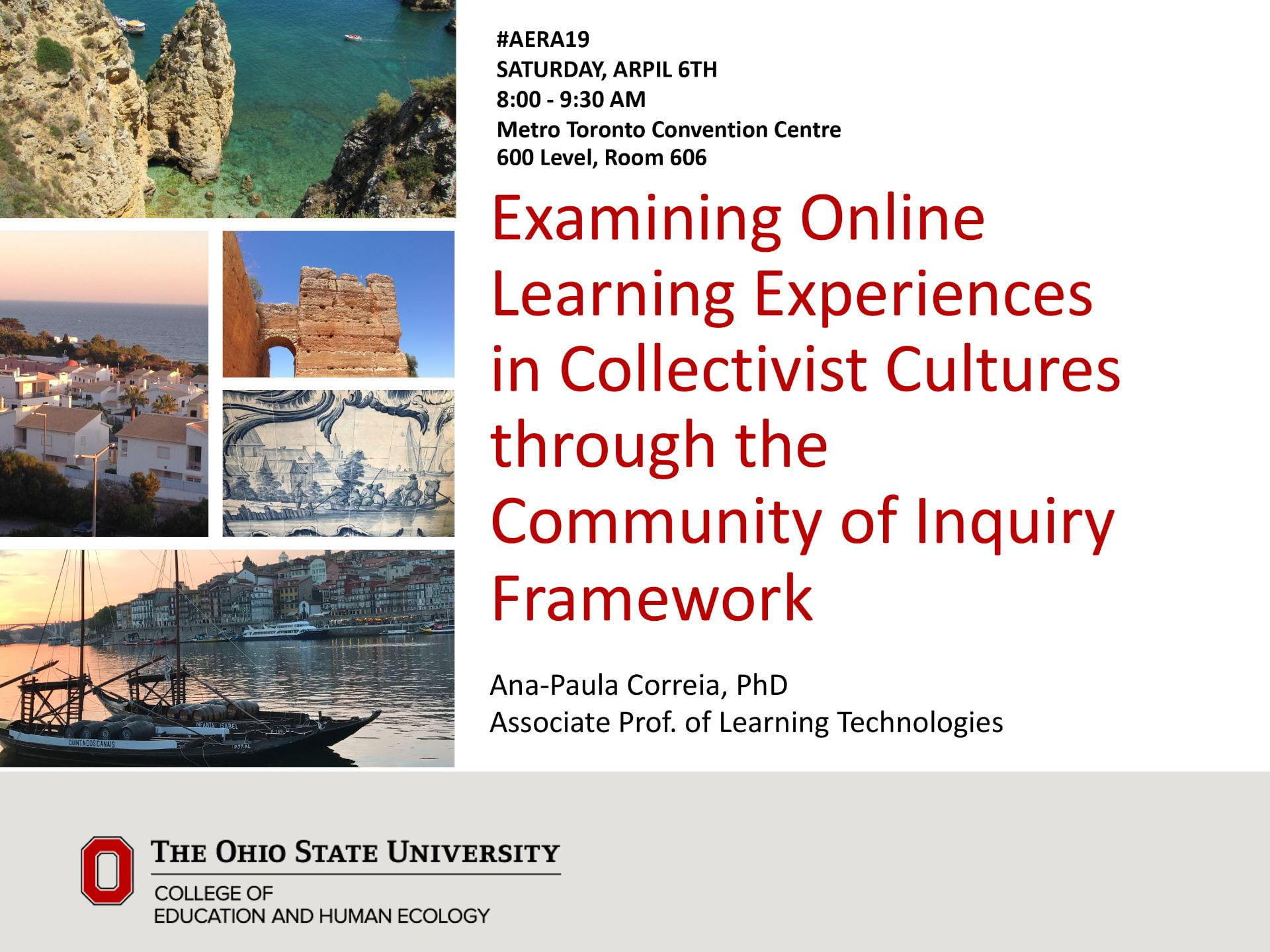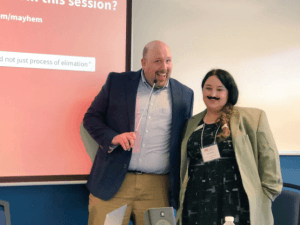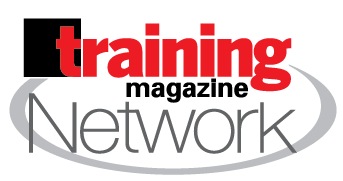By Deborah Hewlett (hewlett.26@osu.edu)
Deborah Hewlett is a doctoral student in Learning Technologies at The Ohio State University. She taught high school mathematics for ten years and was simultaneously an adjunct for Columbus State Community College and Mount Vernon Nazarene University (MVNU) for three years before transitioning to a full-time position in the mathematics department at MVNU in the August of 2016. The following content is Deborah’s accounts in the first person while teaching during the COVID-19 pandemic.
“I have been teaching mathematics at Mount Vernon Nazarene University (MVNU) since the fall of 2016. In the fall of 2019, I took on additional responsibility when I was appointed Director of the Center for Innovative Education. What exactly that meant was a little fuzzy to me, but in general, I knew I would be helping with faculty development and learning technologies. What I didn’t know was how important that was about to become.
The first semester was very calm as I worked with my coordinator to try to get the lay of the land. I held committee meetings as the newly appointed chair of the Online Learning & Technology Committee, worked on funding to renew essential software licensing, and sent out monthly newsletters to faculty. As spring 2020 rolled around, I worked with my committee to evaluate Technology Innovation in Education Grant applications before heading off for spring break, not knowing that the week we came back would change me forever.
Tuesday, March 10, 2:00 p.m.: Myself, my coordinator, the Director of IT, and the Vice President of Academic Affairs met to discuss “contingency plans.” If we needed to transition to remote learning in the future, what resources would we need? What training would the faculty need?
4:29 p.m.: My coordinator and I receive an email message. Subject: “It’s Happening” Message: Deborah and David: We are moving to distance learning very soon. The Faculty Forum Scheduled for Thursday is on you two to bring faculty up to speed….”
4:30 p.m.: Emergency faculty meeting
Wednesday, March 11, 2020: Final day of normal classes
Thursday, March 12, 8:50 a.m.: Faculty Forum in which myself and a few colleagues did our best to provide emergency training to the entire MVNU faculty to prepare them for emergency remote learning.
Things moved quickly; in less than two days my job went from “what ifs” to working with faculty on how to survive the rest of the semester as we helped our students continue their education from home amid a global pandemic. In private, I broke down and cried. This was too much for me to handle, I was so new and had so little experience, how was I supposed to lead our entire faculty? In public, I was positive, supportive, and enthusiastic, proclaiming that “we can do this, and we will do it well!” Some faculty were already using Zoom for hybrid instruction while others had never even put resources online in our Learning Management System. Over the next few months, I assisted faculty (remotely) with technology issues, help them put assessments online, and facilitated training as needed.

MVNU Math department masked and socially distancing on our first day of classes.
During the summer of 2020, I worked with my coordinator, the academic leadership team, and IT to figure out how we could return to the classroom in the fall. The plan was to reopen the campus with low-density classrooms. Students had to be seated at a minimum of six feet apart, which meant that in most cases not all students would be able to fit into the room at the same time. Some classes were reassigned to larger rooms, but most were going to have to do hybrid learning. Half of the students would be in the classroom while the other half attended remotely, and the next class day they would switch. The technological challenge with this was that some classrooms had VGA cables while others had HDMI, and our faculty were using five different models of school-issued laptops with three different types of ports. It felt like that scene in the movie Apollo 13 where the engineers in Houston had to figure out how to help the astronauts in space fit a square filter in a round hole. The IT department wired each classroom with the necessary USB hubs, cameras, and connections while I created documents and videos for each laptop model instructing faculty on how to connect for hybrid learning as well as how to pair their Bluetooth headsets with their computers. Each faculty member was issued a packet with a headset and the various adaptors needed for their laptop model, and myself and my coordinator held live workshops with each department on campus to help them practice connecting.

Students working in hybrid groups during one of my classes.
The fall of 2020 was as much of a success as it could be. Students could not sit next to each other, work in groups, or see each others’ full faces, but they could be on campus and in the classroom. While there was some grumbling, in general everyone was just thankful to be back. Technology that would not have been available even 10 years ago made it possible to be back in the classroom safely, and we made it through the entire year in-seat. Faculty were weary of the hybrid modality, but we provided our students with the best experience that we could through the spring of 2021.
In the fall of 2021, we opened back up in a near-normal environment. Students were no longer required to socially distance, which allowed faculty to resume collaborative learning and allowed students to build relationships with each other. While weekly Covid-19 surveillance testing on campus resulted in students being in and out of quarantine, we took the technology and experience from our hybrid learning year and moved these students seamlessly in and out of remote learning. Faculty used technology like breakout rooms and online whiteboards to help students participate virtually, and students in the classroom used their laptops to work with any remote group members via live sessions during class.
While the pandemic continues, MVNU is nearly back to normal. We are still utilizing hybrid technology as needed, but for the most part they are getting the full college experience. We are no longer required to wear masks, and activities like intramural sports have resumed. As for me, well, I went from helping those few faculty members who were interested in technology to leading a campus-wide pivot to remote learning. Had I known I would be thrust into the spotlight like that I might not have taken the position, but I am thankful for the ways I have grown through it. I am more confident in my leadership skills and have built relationships with faculty and staff across campus. The big question for me is, “what now?”

Sporting the face shield many of us used fall 2020 while my masked and socially-distanced students took a test.
Now that I am not spending time ‘putting out fires’ so-to-speak, how will I help my university move forward into the future? What long-term changes will the pandemic bring to higher education and how can I help keep us relevant? Beyond being relevant, how can I help us innovate? These are questions I am seeking to answer. I started taking courses toward a Ph.D. in Learning Technologies at The Ohio State University in the summer of 2020 and am using the knowledge I have gained through my coursework to be innovative in my courses. I now seek to research ways to innovate education and support faculty and students in higher education.”
 Fan Xu has recently been elected the new Social Media Officer for the Association for Educational Communications and Technology Graduate Student Assembly (GSA). Fan run for this office because of her passion for serving her peers and contributing to the GSA community.
Fan Xu has recently been elected the new Social Media Officer for the Association for Educational Communications and Technology Graduate Student Assembly (GSA). Fan run for this office because of her passion for serving her peers and contributing to the GSA community.













